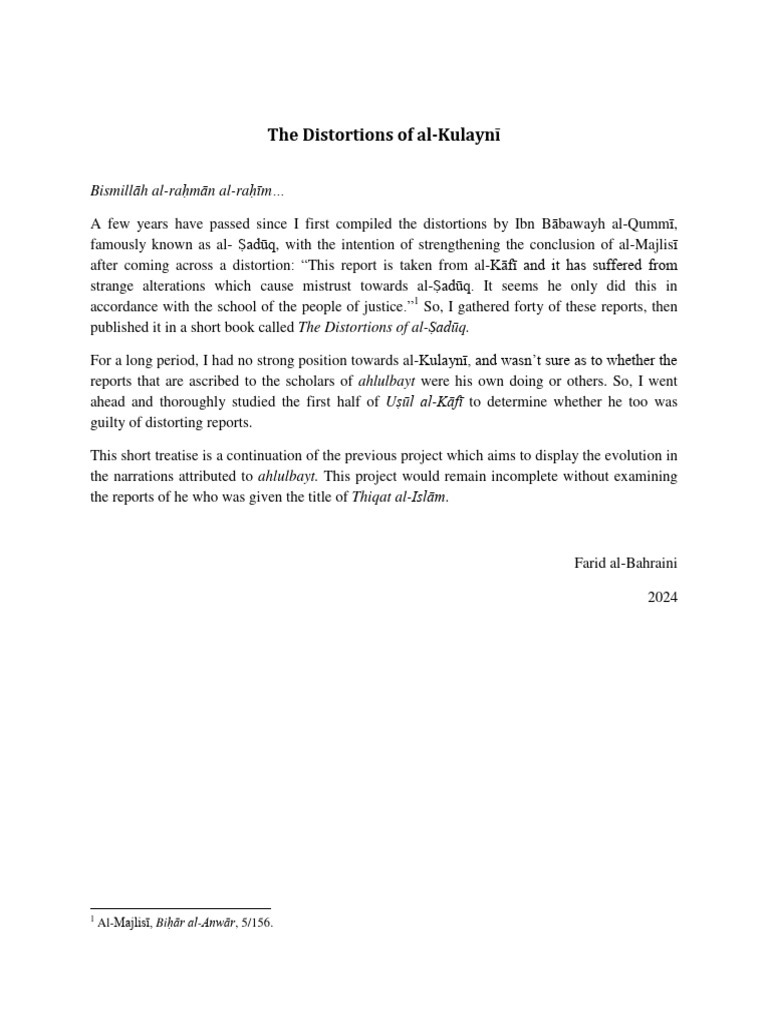Shia teachings hold a profound place in Islamic discourse, with many scholars contributing to the corpus of knowledge that defines the sect's beliefs and practices. One formidable figure in this intellectual tradition is Muhammad b. Yaqub al-Kulayni, who played a crucial role in codifying the teachings of Shia Islam. His magnum opus, the "Al-Kafi," remains a cornerstone of Shia jurisprudence and theology. This article delves into the significance of al-Kulayni's contributions, the content one can expect from his works, and the broader implications of his teachings within Shia thought.
1. Historical Context of Al-Kulayni
Born circa 864 CE in the region of Al-Kufa, al-Kulayni's life unfolded during a time marked by political upheaval and religious strife. The Abbasid Caliphate was at its zenith, embroiled in conflicts with the emerging Shia identity. Al-Kulayni's scholarly pursuits were deeply intertwined with the socio-political realities of his era, as he sought to preserve and disseminate Shia teachings amid adversity.
He studied under prominent scholars of his time, which enriched his understanding and facilitated the compilation of Hadith literature relevant to Shia Islam. This endeavor was particularly critical as Shia Muslims faced oppression, necessitating a systematic approach to maintain their theological heritage.
2. The Al-Kafi: Structure and Content
The "Al-Kafi," composed of three sections—Usul al-Kafi, Furu al-Kafi, and Rijal al-Kafi—embodies a comprehensive repository of Shia thought. Each section serves a distinctive purpose:
- Usul al-Kafi: This segment delves into theological principles, covering topics such as the nature of God, prophethood, the Imamate, and eschatology. Readers encounter profound discussions regarding divine attributes and the significance of the Twelve Imams, forming a robust foundation upon which Shia belief system stands.
- Furu al-Kafi: Herein lies the applied jurisprudential facets of Shia Islam, detailing practical laws governing various aspects of life—rituals, ethics, and social conduct. This section exemplifies a practical approach to Islamic law, offering guidelines for family life, business ethics, and communal harmony.
- Rijal al-Kafi: This unique segment focuses on the narrators of Hadith, evaluating their credibility and transmission. The rigor with which al-Kulayni approached this aspect underscores the importance of authenticity in religious knowledge.
Such a structured approach allows readers to navigate the expansive landscape of Shia teachings, making the text accessible while showcasing the depth of scholarship embedded within.
3. Key Themes and Teachings
The teachings of al-Kulayni resonate with critical themes that reflect foundational beliefs in Shia Islam. Among these, the notion of Imamate is particularly prominent. Al-Kulayni articulates the divine appointment of leaders following the Prophet Muhammad, emphasizing their role as spiritual and temporal guides. This doctrine differentiates Shia Muslims from their Sunni counterparts, who subscribe to a different understanding of political authority in Islam.
Furthermore, al-Kulayni's discussions regarding ethics and morality are worth noting. His writings promote a code of conduct steeped in compassion, justice, and social responsibility. Through narrations attributed to the Imams, he accentuates the importance of moral integrity and communal support, encouraging adherents to embody these virtues in their daily lives.
Additionally, the eschatological perspectives outlined in the "Al-Kafi" offer a glimpse into Shia beliefs concerning the afterlife, the Day of Judgment, and the return of the Mahdi, the awaited savior. These teachings serve to reinforce hope and resilience among followers, instilling a sense of purpose grounded in the belief of divine justice.
4. Al-Kulayni’s Impact on Shia Scholarship
The influence of al-Kulayni extends far beyond his own era. Subsequent scholars have built upon his foundations, utilizing the "Al-Kafi" as a reference point for both theological explication and jurisprudential development. His meticulous attention to the authenticity of Hadith has set a standard for evaluating narrations within Shia scholarship, prompting rigorous methodologies in the transmission of religious knowledge.
Furthermore, his work has stimulated a wealth of academic inquiry surrounding the themes he elucidated. This intellectual legacy has inspired generations of scholars to explore the intersection of faith, ethics, and governance within the Shia tradition, fostering a rich tapestry of thought that continues to evolve today.
5. Contemporary Relevance
In contemporary discourse, al-Kulayni's teachings remain pivotal as the Shia community navigates modern challenges. As questions of identity, social justice, and interfaith dialogue become increasingly salient, the principles espoused in the "Al-Kafi" provide a framework for addressing these complexities. Shia scholars often turn to al-Kulayni's insights as they advocate for justice, equality, and ethical behavior in a globalized world marked by diversity and pluralism.
Moreover, the emphasis on moral responsibility and communal welfare can inspire contemporary adherents to engage more thoughtfully with societal issues, advocating for the marginalized and fostering inclusivity. Al-Kulayni’s teachings encourage a reflection on the core values of Shia Islam, urging followers to contribute positively to their communities and uphold the tenets of faith with dignity.
In conclusion, Muhammad b. Yaqub al-Kulayni’s contributions to Shia Islam are profound and enduring. His work, particularly the "Al-Kafi," serves as a foundational text that shapes the belief systems, ethical frameworks, and community dynamics of Shia Muslims. As the community faces the trials and tribulations of modernity, revisiting al-Kulayni’s teachings can provide invaluable insights and guidance, fostering a deeper understanding of their rich heritage and purpose.


